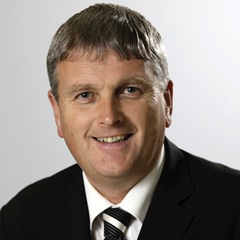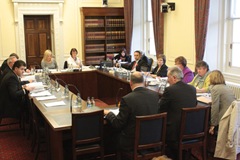Health checks
 Jim Wells updates Peter Cheney on the Health Committee’s role, one which the Chair thinks puts it above its Assembly counterparts.
Jim Wells updates Peter Cheney on the Health Committee’s role, one which the Chair thinks puts it above its Assembly counterparts.
“We are the most important committee” is Jim Wells’ contention as he talks through the Health Committee’s work to date. For evidence for that claim, in his view, readers need not look further than the main daily stories in the news.
“There’s not a day goes by that there isn’t a story in the media on a health-related issue. Frequently, it’s the headlines and it’s inevitable that as Northern Ireland becomes a more and more normal society, health will be more and more dominant as an issue.”
In lobbying terms, Northern Ireland’s 169 health charities, the professional organisations and unions are always at the committee’s door. Wells finds himself “constantly in demand” compared to the Regional Development Committee, where he was Deputy Chair and received only occasional requests for meetings.
He succeeded Iris Robinson in the post last July, after the DUP decided to stand down MPs from Assembly chairs. Climbing up Slieve Binnian, in the Mournes, he was offered the choice between health and social development over the phone and asked for 24 hours to consider it: “I think I made the right choice but I never for one minute could contemplate what it involved.”
Health’s complexity can be seen when the basic numbers are added up. Seventy thousand staff are employed and the spending review sets aside £4.3 billion in current expenditure next year, making up 48 per cent of all day-to-day spending.
“Somebody told me recently that health in Northern Ireland spends more than the Government of Afghanistan [on all areas] – and they’ve got 28 million people and we’ve got 1.7 million,” Wells says. He adds that the comparison could be an unfair one, given that country’s poverty, but it shows the size of the challenge.
Scrutiny
While the committee is technically tasked with advising and assisting the Minister, he sees it more to scrutinise and hold him, his finances and policies to account. The Chairman must oversee the committee neutrally and without bias.
“The committees do generally reach consensus and don’t split. We’ve a common aim of holding the department to account,” he states.
Like Barry McElduff, he separates his comments as Chairman from those as party spokesman, although many of his latter views are similar to other parties. He has criticised bonuses for hospital consultants and thinks most other members would do the same. The committee has not had to go to a vote during his term to date.
Put to him that separating the two roles completely would avoid any conflict of interest, he replied that as the Chairman should be the most informed Health Committee member, he or she has a better grasp than another backbencher. Wells thinks it would be unreasonable to put that pressure on another committee member.
“It’s not party political in the sense that there’s no great division between nationalism and unionism or between urban and rural,” Wells says of its work. “The split is between the Minister demanding more resources for health and other members of the committee and other MLAs and ministers saying: ‘Where are we going to get this. Could we not be making better use of the huge budget we have already?’”
Ulster Unionists on the committee naturally support the Minister but his view is that any extra money would have to be cut from schools, roads or other areas. Like every other committee, it will be focusing on budgets going forward; the spending review demands £113 million savings in health.
The committee has highlighted where it thinks money has been wasted e.g. employing 57 press officers across the Health Service and the use of branded drugs rather than their generic equivalents. Some GPs, he points out, demand the right to prescribe the branded product, even if it costs £26 compared to £1 for the generic. A “vast saving” could be made here and he claims the Minister has been “very reluctant” to oppose this practice.
“I think the Minister simply has got himself into a repetitive mantra: ‘More money, more money, more money.’ I think before he does that, he has to prove to the public that the vast budget that we have – £1,830 for every man, woman and child in Northern Ireland – is being spent effectively.”
Achievements
Among its success, the committee counts its obesity reports, which highlighted that problem’s potential to overwhelm the Health Service. Twentyfour recommendations were made and Wells is pleased with the positive answers now coming from DHSSPS.
“The value of criticism is greatly devalued if it’s used constantly and without reason,” he points out, emphasising that the committee does work with the department where it thinks the public will benefit.
On swine flu, it strongly supported the department and gave it credit for tackling the problem well. Wells suggested that the staff of special schools should be vaccinated as well as their children, and the department went to work on the idea immediately; it was carried out within two days.
The committee has taken a strong line on public health and wants to see a ban on tobacco displays coming into force in October. Opposition will come from the tobacco lobby, retailers and some constituency MLAs e.g. from North Antrim for the Gallahers factory. However, Wells warns: “You can’t possibly be on a health committee and advocate anything that increases or maintains the use of tobacco.”
It also supports a ban on under-18s using sunbeds, which may be opposed by some beauty salons. Scotland has pioneered this move; MSPs voted it through in June 2008.
“At times, the committee can give political backing to the Minister in doing unpopular things as well as criticising him when he does things we don’t agree with,” he explains.
 Plans
Plans
Child protection is a major item on its forward work programme. As the committee looks at plans for a safeguarding board for Northern Ireland, it wants to learn from the successes and failures of similar boards in Great Britain. Visits to social services in Bolton and Bradford are planned.
Following the Bamford review, Wells also expects “probably the largest piece of legislation Northern Ireland will ever see” to come forward after the next Assembly election; the last major mental health reforms look place in 1983. New laws on adoption are also due.
Meanwhile, the committee deals routinely with a large workload, including the framework documents i.e. strategies for specific conditions such as cancer and dementia. Following the critical RQIA report in hospital hygiene, the committee held a series of public evidence sessions, which put the spotlight on those responsible for lapses.
Relations between members are “surprisingly good” although he admits the chair would say that. They obviously come from contrasting backgrounds but the meetings are “normally very goodhumoured”. Some have relevant experience from their careers e.g. Dolores Kelly in social care and GP Kieran Deeny.
He finds that people leave their party political baggage at the door but can be forceful when defending their constituencies; with the shortage of acute services in Omagh, it’s no co-incidence that three West Tyrone MLAs are there.
Previously, Wells’ own interests in health policy were also local but he does enjoy his job, despite it coming out of the blue.
“[I] wondered how I would take to it but it has been exceptionally interesting,” he surmises. “It’s never dull. It might be very demanding and frustrating but it’s never tedious.”
Committee members
- Chair: Jim Wells (DUP)
- Deputy Chair: Michelle O’Neill (SF)
- Thomas Buchanan (DUP)
- Dr Kieran Deeny (Independent)
- Alex Easton (DUP)
- Sam Gardiner (UUP)
- Dolores Kelly (SDLP)
- John McCallister (UUP)
- Conall McDevitt (SDLP)
- Claire McGill (SF)
- Sue Ramsey (SF)





